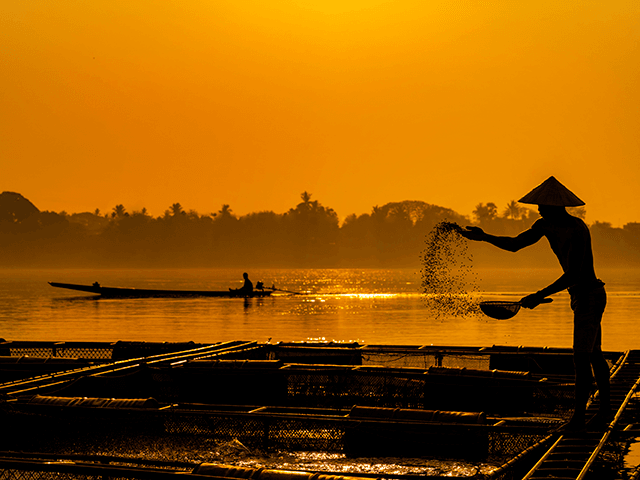China shut down almost half of the water flow through its southernmost dam on the Mekong River on December 31, reducing water levels downstream by enough for a U.S.-funded satellite monitoring system to notice.
On Tuesday, January 5, the Chinese finally got around to formally notifying Vietnam, Laos, Thailand, and Cambodia it was throttling the water supply to their stretches of the vitally important Mekong waterway.
The Mekong River Commission, a joint agency of the four southern nations, said on Wednesday that China promised the river “will be gradually restored to its normal operation status on January 25.”
Before China said anything, the Washington-based Stimson Center reported in the January 3 update of its Mekong Dam Monitor project that water levels were significantly lower at several downstream checkpoints.
The Stimson Center noted that China “provided no notification of the sudden and unusual change that will impact fish and farming processes downstream.” The bulletin also highlighted all-time water lows in some reservoirs in Laos.
Voice of America News (VOA) quoted the leader of the Mekong Dam Monitor project, Brian Eyler, taking pains to avoid antagonizing the Chinese while expressing a good deal of irritation with their practices:
“The restrictions of water from the downstream are certainly not welcome. They are unusual for this time of year and not part of the Mekong’s natural cycle. However, what is welcome are China’s notification of its changes and dam operations that are causing the restrictions,” Eyler said.
“China is making good on its promise to notify downstream countries when it changes its dam operations. But there are some inconsistencies with the notification,” he said.
He said that China did not notify the downstream countries prior to holding back the water. After it became aware of eyewitness accounts of the river level dropping downstream, the monitor was able to identify the Dec. 31 restriction in data.
Eyler said China issued a formal notice within 12 hours of his project alerting the Mekong River Commission and posting about the situation on social media. He described China’s notification as “late” and evidently “compelled by external actors rather than of its own admission and own volition.”
VOA pointed out that China has been criticized for exacerbating droughts in the southern Mekong region with its dams, and made a commitment to share all of its data on the river with the Mekong River Commission in October 2020, two months before it cut back the water supply without warning anyone.
Eyler has been strongly critical of China’s treatment of the Mekong in the past, having co-written a book on the subject pessimistically titled Last Days of the Mighty Mekong. He wrote an article for Foreign Policy in April 2020 that accused China of “devastating” the Mekong with its eleven huge dams.
Eyler also criticized some dam projects in the downstream countries for having undesirable environmental impacts, but he was most displeased with China for treating water management like a “state secret,” using its control over the upper Mekong River to hold its neighbors “hostage,” and blocking enough water to make the Mekong Delta droughts of 2019 dramatically worse. As Eyler told it, scientists monitoring the river realized the drought was much worse than above normal rainfall in the upper Mekong would indicate and, upon investigation, they discovered China was hoarding so much water that fish were left flopping around on dry ground in Thailand and Laos.
Eyler pronounced China’s water policies “puzzling” in April and wondered if they were part of a “coordinated policy to bring the Mekong countries to heel,” or perhaps just a result of corruption and bureaucratic ineptitude among Chinese dam operators and regulatory agencies. He pointed out it was hard to tell, with virtually all data about China’s dams kept secret by the government and urged the Chinese to be more forthcoming in the future. Presumably, his somewhat moderated criticisms of China after the discovery of the December 31 dam blockages was a carrot-and-stick approach to encourage China to share more data instead of retreating back into total secrecy.
Interestingly, Eyler concluded his April observations by noting that China defiantly refuses to take advice from foreign observers and has a habit of dismissing critical studies as U.S.-funded conspiracies to make the Communist Party look bad, but it also seems to monitor what those outside observers are saying, and will sometimes quietly modify its behavior after considering data from foreing sources. That appears to be precisely what happened after the Mekong Dam Monitor project publicly announced the reduced water levels in the four downstream nations this week.

COMMENTS
Please let us know if you're having issues with commenting.